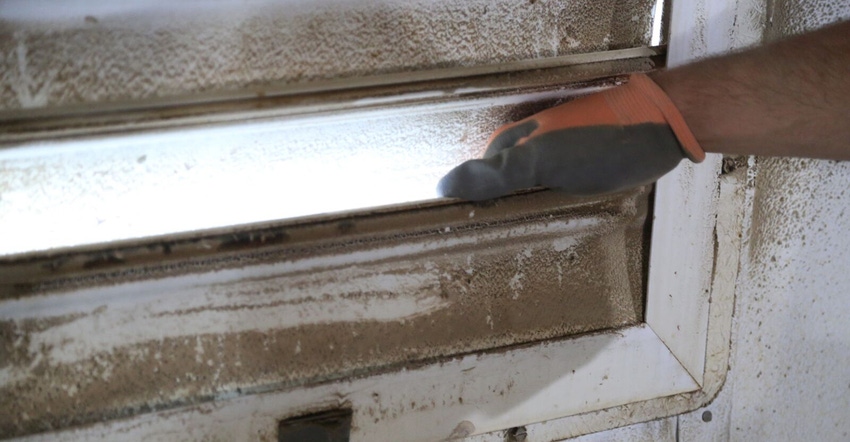Minimizing the impact of summer heat
Don’t forget about our most important asset — our people.

While unseasonably cool and wet weather patterns dominated April, May and June, summer has been in full force this July. Summer heat has a big impact on pigs and producers alike. We can save a few bucks on LP when starting up wean-to-finish barns this time of year, but in general, the summer heat impact on our pigs is almost all negative.
Growing pigs decrease their feed intake which in turn lowers their average daily gain, and in severe cases can result in gastric ulceration and death. On our sow farms we see negative impacts to both still born and sow mortality rates when due-to-farrow sows experience heat stress. Last but certainly not least, our animal caretakers tire quickly and can themselves suffer the negative effects of heat stress. We need to use every tool at our disposal to minimize the impact of summer heat over the next several months.
Minimizing the impact of summer heat on growing pigs
Most growing pig barns use some form of misters or sprinklers to facilitate evaporative cooling of the growing pigs. These systems are generally turned on when pigs are older than 12 weeks of age and the barn temps are above 85 degrees F. These systems are critical — unlike us humans, pigs lack the ability to facilitate evaporative cooling on their own through sweating and as such we have to provide our pigs with water on their skin to cool them off. It’s a common misconception that the watering process is what cools pigs down, it’s actually the opposite, it’s the time when the misters aren’t running and the water is evaporating off the pigs during which they are being cooled. Don’t increase your mister run times thinking you’ll be doing the pigs a favor, briefly run your misters or sprinklers (1 to 2 minutes) and then allow at least 10 minutes for drying before they run again.
When the system is running, visually observe each mister or sprinkler every day and replace as needed, keep a few replacements in your pocket as you chore the barn so that the routine maintenance is quick and timely. We need 100% of the system running effectively if we have any hope of beating the summer heat.
Fan louvers quickly become coated with dust, especially in tunnel ventilated growing pig barns. As the dust builds up, its weight on the louvers prevents them from allowing maximum airflow and as such decreases the volume of air being pulled across our pigs. While preventing dust from accumulating isn’t generally possible, removing the dust from louvers is a quick, easy and beneficial task. Keep a broom down by the fans and use it to brush off the dust regularly. You’ll see an instant impact to louver opening which will increase airflow and decrease the summer heat impact on average daily gain and ulcers.
Minimizing the impact of summer heat on sows
Sow farms often use cool cell pads to charge the incoming air with cold water and actually decrease the air temperature as it enters the pig barn. The cool cells work best in low humidity situations. Unfortunately, when humidity is high the air is already charged with water which prevents a big change in temperature as air is pulled through the pad. Similar to dirty louvers, dirty cool cells decrease airflow and limit the efficacy of cool cells. Inspect your cool cells every day, make sure the pads are thoroughly soaked in all areas and trouble shoot dry spots on the pad to get water flowing on them as soon as they’re found. In extreme cases, use a small portable pressure washer and fan tip to gently wash your cool cell pads and remove debris. Cool cells do need to be changed out periodically, this is normal routine maintenance and if you haven’t inspected your cool cells for airflow already this summer, do it now to make sure your system is fully functional and providing the biggest possible decrease in air temperature coming into the sow farm.
Due-to-farrow sows are high risk for heat stress. When due-to-farrow sows get hot they pant, exerting a massive amount of energy trying to keep themselves cool. This is a critical situation — the energy she’s using to cool herself off is the same energy she needs to farrow her baby pigs. When a pregnant sow is in heat stress it’s an emergency situation — failing to act quickly will at a minimum result in increased still born piglets and increased chances of retained pigs. In severe cases you’ll likely lose both the sow and her entire litter. When you see a sow in heat stress you need to immediately wet her down and increase airflow around her.
Almost all farrowing houses have plastic totes used for split suckling, hot boxing, etc. Grab a 16-gauge needle and poke a half dozen holes in the bottom of one of these totes, fill the tote with water and place it on top of the crate above the hot sow. Try to situate the tote so that water is dripping directly onto her shoulder. Twenty-inch box fans are another cheap and easy tool to use on the hot sow. Plug the box fan into the same outlet you use for the heat lamp and place the box fan next to the dripping tote above the sow, blowing air directly down onto her. The combination of a fan and a dripping tote can often counter the effects of heat stress in less than an hour. I encourage farms to keep a couple of dripping totes and fans with the farrowing monitor supplies. Check the due-to-farrow farrowing rooms first thing in the morning and use these tools to help any sows in heat stress. Come back and check again in an hour, moving the dripping totes and fans to other sows as needed throughout the day.
Minimizing the impact of summer heat on animal caretakers
Don’t forget about our most important asset — our people. Try to schedule the day’s most arduous tasks for early morning when the temperatures are the coolest. Moving pigs first thing in the morning versus during the heat of the afternoon will make for much happier pigs and people. Stop and take frequent, quick breaks to catch your breath and hydrate. Water is great, but we often need to replace electrolytes as well — consider having Gatorade or whatever sports drink of your choice available at the barns throughout the summer. Avoid the heavily caffeinated energy drinks that have become all so common — caffeine is a mild diuretic meaning it will have a negative effect on hydration.
Find the coldest spots in the barn and take your rest breaks at those locations. If you don’t have access to an air-conditioned office, standing in front of cool cell pads or right next to the tunnel curtain in a wean-to-finish barn are the next best places to be. Pace yourself and don’t wear yourself out, the pigs need your help, so we need you to stay fresh and functional all day long. Pay special attention to co-workers who are pregnant or nursing mothers and those who have existing medical conditions, especially heart disease, high blood pressure or lung disease. Make accommodations accordingly and team up those at high risk for heat stress with a buddy at all times in the barn.
Source: Clayton Johnson, who is solely responsible for the information provided, and wholly owns the information. Informa Business Media and all its subsidiaries are not responsible for any of the content contained in this information asset.
About the Author(s)
You May Also Like





